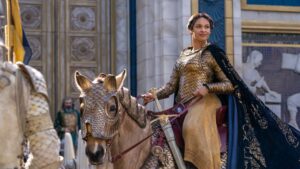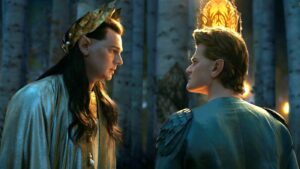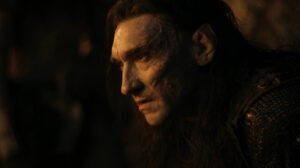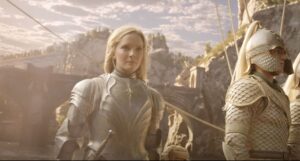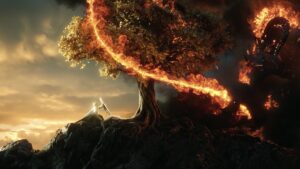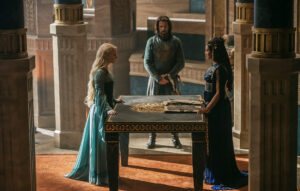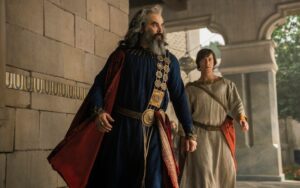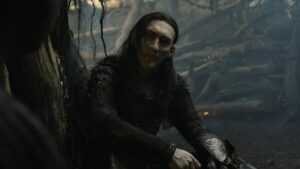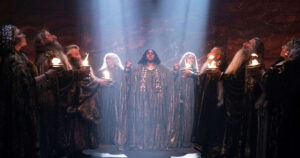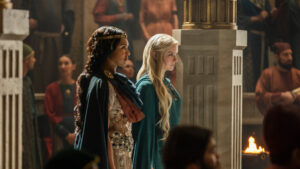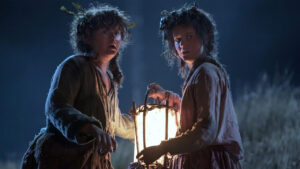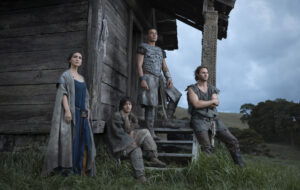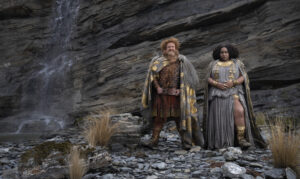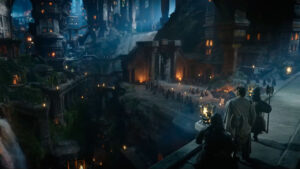MAJOR SPOILERS FOR THE RINGS OF POWER EPISODE SIX AHEAD!
“”The Eagles!” cried Bilbo once more, but at that moment a stone hurtling from above smote heavily on his helm, and he fell with a crash and knew no more.”
– The Hobbit, The Clouds Burst, p. 260
“‘The Eagles are coming! The Eagles are coming!’ For one moment more Pippin’s thought hovered. ‘Bilbo!’ it said. ‘But no! That came in his tale, long long ago. This is my tale, and it is ended now. Good-bye!’ And his thought fled far away and his eyes saw no more.”
– The Lord Of The Rings: The Return Of The King, The Black Gate Opens, p. 893
For as much as J.R.R. Tolkien’s great tales, The Silmarillion and The Lord Of The Rings in particular, are stories set in times of war that deal with related themes, they are not about the act of warfare itself. Wherever he possibly can, Tolkien simply avoids having to write about battles entirely by knocking his viewpoint characters unconscious in the first five minutes of combat and having them wake up hours later after the fighting has concluded – see, for example, the two passages quoted above. Where he cannot fall back on this trick, he nonetheless still pulls back from the heat and intensity of the action to give readers a concise play-by-play of the battle from the distant perspective of a narrator. I suspect that as a veteran of the First World War he had difficulty writing about bloodshed in great detail.
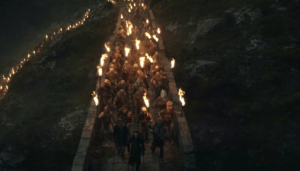
Going into The Rings Of Power‘s sixth episode, therefore, my worst fear was that it would be, from beginning to end, an interminable action sequence devoid of the microcosmic, quiet and emotionally-charged moments between characters that Tolkien generally preferred to settle on between more vague descriptions of military movements – to name just a few examples, Aragorn leaning wearily on his sword to chat with Éomer at Helm’s Deep and again on the Pelennor Fields; Éowyn trading blows with the Witch-king while protecting the body of her fallen king; Merry and Pippin stumbling through the streets of Minas Tirith to the Houses of Healing. The opposite extreme would have been a battle robbed of even a pretense at weight and consequence by characters stopping every five seconds to make some witty remark in Marvel-movie fashion.
Happily, my fears did not come to fruition. Under the direction of Charlotte Brändström (only the second female director on this franchise, at least to my knowledge, after Fran Walsh, Peter Jackson’s wife and co-director on The Lord Of The Rings), The Rings Of Power‘s largest and longest action sequence to date strikes a balance between being entertaining and engaging for its audience and absolutely exhausting for its characters. Indeed, the violence is more brutal than anything in the first five episodes – and at times, more than anything in either of Peter Jackson’s two trilogies, which generally refrained from showing human characters die gruesome deaths. Brändström seems to have no such qualms, pushing the limits of the TV-14 rating about as far as I think is possible.
But the most intense moments in this episode occur amidst lulls in the fighting, such as when the village healer and de facto leader of the Southlanders, Bronwyn (Nazanin Boniadi), is wounded in battle by an arrow and has to try and remain still while her lover Arondir (Ismael Cruz Córdova) pulls the shaft from her shoulder, all while she’s losing lots of blood and watching wide-eyed as her fellow Southlanders are dying in droves without her assistance. I’m squeamish about gory injuries, so the fact that I had to turn my face away from the screen both times I watched the episode may say nothing about how brutal it actually is, but it’s not just the bloodiness of the scene or the sound-effects of the arrow sliding through flesh that made me physically shudder – Boniadi and Córdova’s tortured expressions and frantic performances help to ensure the scene is difficult to watch, in the best way.
But in an episode that also features the very first kiss between their two characters, it’s a bit of a shame that Boniadi and Córdova’s portrayal of mingled pain resonated with me, while their halfhearted attempts to convey romantic interest in the other fell flat. I simply don’t understand, six episodes into the first season, why they’re in love beyond the fact that they share an interest in nurturing and healing – plants in Arondir’s case, people and animals in Bronwyn’s. I appreciated that they finally confessed their love for each other at the same spot where they rendezvoused in episode one, hands clasped over the living woods of a tree growing in the middle of Tirharad, thereby connecting them to Middle-earth and to the Vala whom Arondir claims “watches over growing things and those who tend them”, Yavanna Kementári (her name, sadly, cannot legally be used by Amazon, as it never appears in The Lord Of The Rings or its Appendices), but the heavy emphasis on this one surface-level aspect of their attraction doesn’t make up for an absence of anything else deeper to it.
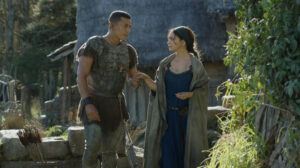
Their most touching moment comes when they plant the alfirin seeds Bronwyn gave Arondir back in episode one, to ensure the survival of one new life before the imminent death of hundreds, if not thousands. It’s a beautiful ritual, one we also see the enemy leader Adar (Joseph Mawle) partake in at the beginning of the episode, subtly indicating to the audience that, while he no longer identifies exclusively as an Elf, he has retained many of the memories and customs he learned before he was turned to the darkness. The question of what Adar is and whether he and his Orcs have any claim to the respect they say they’re owed is one that looms heavily over this entire episode, which sees Adar leading his armies into battle with the intention of taking the Southlands – not for political purposes, but to establish a homeland for the Orcs, his “children”. He sees them as living beings whose creation, though apparently unnatural, was nonetheless permitted by the One (i.e. God or Eru Ilúvatar as He is called in Middle-earth) for a reason, in the same way Dwarves and Ents were created by other Valar and then integrated into Eru’s plan.
Adar’s nuanced opinions on this controversial subject stand in stark contrast to how Galadriel (Morfydd Clark) describes her enemies bluntly as “a mistake”, made in mockery of Elves without the blessing of the One, rendering them devoid of even the semblance of sentience and free will. Adar insists that his Orcs are masterless, following him out of genuine love, not fear or domination of the spirit. Galadriel retorts that they are still bound to Sauron, their true master, whom Adar believes he killed long ago. The argument between these two characters is one which J.R.R. Tolkien had with himself many times throughout his later life, as he grew increasingly uncomfortable with the theological implications of an evil race and began to explore alternative origin stories for the Orcs – though ultimately he was never able to settle on one he liked, and instead fell back on the excuse that the original Elven authors of the great tales were biased and unreliable, so their account of events, which was nonetheless published in The Silmarillion, might well have been a fabrication.
Where The Rings Of Power has leaned most heavily into the unreliable narrator trope, I have a suspicion it’s for many of the same reasons: the showrunners and writers either haven’t settled on the answers to this and other confounding questions, or simply don’t want to make irreversible choices that could be divisive within the fandom. Leaving the audience to draw their own conclusions once too many times can easily lead to frustration, although at least in this case there’s plenty of evidence in the writing and in Mawle’s charismatic performance that Adar is exactly what he says he is: a living person driven by the beatings of his own heart, deserving of love, respect, and a home.
Love and respect he has earned from his children many times over through countless personal sacrifices, but a home can only be earned by winning the respect of Middle-earth’s other Free Peoples, either through diplomacy or conflict – and seeing as Galadriel speaks for most Elves and Elf-friends when she says Orcs should be eradicated without mercy, Adar recognizes that diplomacy is useless and prolonged conflict will force his children to make unnecessary sacrifices. He is left with just one option: to cause a volcanic eruption that, apart from turning the tide of the battle in his favor, also leads to the sun being blocked out by a cloud of volcanic dust and ash…which, for the Orcs, means they can at last walk freely across the surface of Middle-earth in the daytime without fear of burning alive. Unfortunately, it also means those seeds Adar planted right before the battle will probably never sprout, but that’s a small price to pay in his mind. He loves his children deeply.

Paternal affection is a thematic undercurrent throughout this episode, which sees the Númenórean ship-captain Elendil (Lloyd Owen) paired up with his wayward son, Isildur (Maxim Baldry), throughout the battle. The two narrowly avoid death by Orc, death by geyser, and death by volcanic rock fragments (properly known as tephra), to come out the other side with a much stronger appreciation for each other – Isildur finally sees his father in action, casting off the disguise of the world-weary widower that he’s worn for so long in a well-intentioned effort to keep his family safe back in Númenor, now fighting fiercely to protect his loved ones. And at the same time, Elendil realizes that his attempts to stifle his son’s interests for the boy’s own sake will never succeed, for Isildur is most reckless when he feels caged-in or cornered.
Now, on that note, we have to talk about Tar-Míriel (Cynthia Addai-Robinson), who watches dispassionately from the sidelines as soldiers under her command give their lives for the cause she loudly endorsed from the comfort of her palace. Either she’s self-important or a coward, and in a world where kings lead by example, it is definitely a Choice by the showrunners and writers to make the first ruling woman of color (and one of the few ruling women, period) in Middle-earth’s history a mere bystander to her first battle. If the writers want to deconstruct antiquated monarchist tropes (that’s me playing devil’s advocate, but it’s plausible given The Rings Of Power‘s other writing choices), then they need to be less subtle about it.
In-universe, I think Míriel made a terrible choice: if my predictions for the finale come true, she’ll already be returning home to find that Pharazôn has accumulated more power in her absence and is now vying for the throne with the support of the citizenry; last thing she needs is for her own troops to weigh in by revealing she did nothing in the battle. She’ll be blamed for what is quickly shaping up to be an unprecedented military disaster, and Pharazôn will effortlessly seize power before either forcing her into a politically-motivated marriage (the canonical sequence of events) or banishing her to the tower in Armenelos where her dying father is confined. Ah well, at least she looked cool in her gilded scale-mail armor and impractical radiate crown.
Despite my fear that Galadriel would be slowed down by her own heavy suit of armor, that proved not to be the case – in fact, a short clip of Galadriel swinging gracefully off the side of her horse to mow down orcs before righting herself in the saddle has been making the rounds on Twitter for the past few days after one viewer complained that it was “unlikeable” and rightfully got piled on in the the quote-tweets and comments for not only ignoring or excusing all of Legolas’ gravity-defying stunts in The Lord Of The Rings and The Hobbit (not to mention descriptions of Galadriel outperforming all the athletes of the Noldor in her youth), but for completely missing the point that The Rings Of Power has been trying to hammer home for a while now, which is that Galadriel is unlikeable.
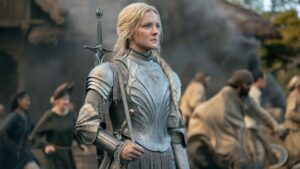
Her arrogance is explicitly shown, more times than I can count on two hands, to be her greatest character flaw and a hindrance at every turn, yet annoying dudebros online act like it’s a “gotcha!” moment when they point it out – no, FirstNameBunchOfNumbers, it just means you have no concept of how positive character arcs work because the idea of bettering yourself is fundamentally abhorrent to you. And Galadriel is working on being more humble: it’s not easy for her, because she always saw arrogance and ambition as a strength (almost like she grew up surrounded by Fëanorians), but she’s slowly learning from Halbrand (Charlie Vickers) that there’s value in treating other people as equals and negotiating with them instead of always using her titles to get what she wants. She relapses when confronted by Adar, who sees right through the new persona she’s been trying to build with Halbrand’s help, but the learning process continues.
And as it does, Galadriel and Halbrand continue to grow closer…and closer…and closer, until they’re sitting mere inches apart from each other in the middle of the forest, trading shy glances and stumbling over their words. Halbrand coyly suggests that fighting alongside Galadriel, basking in her light, he felt for the first time that he could be free of guilt for all his past misdeeds, and Galadriel responds that she felt it too – which is a big deal coming from an Elf, to whom mortal Men are typically insignificant. Compare her intimate conversation with Halbrand to the chat she has with Isildur at the beginning of the episode: with Isildur, she was aloof and distant, as an adult is to a child, but with Halbrand she is present, so near they could believably kiss in that moment. And unless Halbrand is not a mortal, I don’t know how he could get Galadriel feeling butterflies (I mean, he’s good-looking, don’t get me wrong, but Elves don’t just fall for humans or crush on them, either).
Halbrand and Galadriel don’t actually kiss, hold hands, or even embrace in that moment, and I doubt they ever will, though the tension between them is palpable, and everyone – from the actors to the audience – can feel it. If The Rings Of Power had come out in the mid-2010s, these two would have been extremely popular on Tumblr and there’d be no shortage of fan-art and fan-fic dedicated to this ship (“Galbrand”, “Haladriel”, or “Halatáriel”, the latter an amalgamation of Halbrand and Alatáriel, a Telerin name ironically given to Galadriel by her canonical husband, Celeborn). But the fact that they’re still pretty popular even without the boost that Tumblr in its heyday would have provided is a testament to the writing, the chemistry that Clark and Vickers have…and the fact that they’re both very attractive, which is all it takes for us mere mortals to become obsessed, admittedly. I feel for the actor cast as Celeborn who will have to try and one-up Vickers.
In the meantime, the question next week’s episode will have to answer is whether any bond of love born in fields of battle can survive when nourished not by the fear of imminent death, which has a way of loosening tongues that would otherwise remain silent. There’s no hope for Galadriel and Halbrand in the long run, not unless Celeborn is open to a polyamorous relationship (I would not be opposed, Tolkien might be but who can say for sure?), and there’s plenty of time for death to come between Arondir and Bronwyn – not that I believe Bronwyn will die anytime soon, but I’ve always wondered if she might grow resentful towards her immortal lover, and now her near-death experience in battle has allowed that seed of fear and doubt to germinate in her heart.
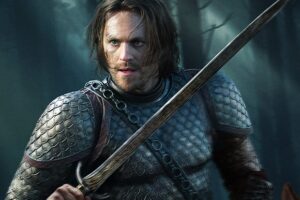
And keep in mind, all of this was derived from an episode that’s largely comprised of people hacking each other to death with swords and spears. That’s the sign of a good script, a good director, and showrunners who understand that Tolkien uses violence not for shock value and never to gratify, but to say that which cannot be said by any other means. That is exactly the purpose this episode serves, and the fact that it just so happens to be one of the most action-packed hours of fantasy television I’ve ever seen is a happy coincidence, if you ask me.
Episode Rating: 8.5/10
